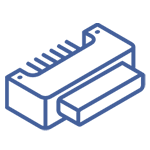

TE Connectivity 141013-1
Manufacturer No:
141013-1
Tiny WHSLManufacturer:
Utmel No:
2460-141013-1
Package:
-
Description:
Contact SKT Crimp ST Cable Mount
Quantity:
Delivery:





Payment:











In Stock : Please Inquire
Please send RFQ , we will respond immediately.
United States
China
Canada
Japan
Russia
Germany
United Kingdom
Singapore
Italy
Hong Kong(China)
Taiwan(China)
France
Korea
Mexico
Netherlands
Malaysia
Austria
Spain
Switzerland
Poland
Thailand
Vietnam
India
United Arab Emirates
Afghanistan
Åland Islands
Albania
Algeria
American Samoa
Andorra
Angola
Anguilla
Antigua & Barbuda
Argentina
Armenia
Aruba
Australia
Azerbaijan
Bahamas
Bahrain
Bangladesh
Barbados
Belarus
Belgium
Belize
Benin
Bermuda
Bhutan
Bolivia
Bonaire, Sint Eustatius and Saba
Bosnia & Herzegovina
Botswana
Brazil
British Indian Ocean Territory
British Virgin Islands
Brunei
Bulgaria
Burkina Faso
Burundi
Cabo Verde
Cambodia
Cameroon
Cayman Islands
Central African Republic
Chad
Chile
Christmas Island
Cocos (Keeling) Islands
Colombia
Comoros
Congo
Congo (DRC)
Cook Islands
Costa Rica
Côte d’Ivoire
Croatia
Cuba
Curaçao
Cyprus
Czechia
Denmark
Djibouti
Dominica
Dominican Republic
Ecuador
Egypt
El Salvador
Equatorial Guinea
Eritrea
Estonia
Eswatini
Ethiopia
Falkland Islands
Faroe Islands
Fiji
Finland
French Guiana
French Polynesia
Gabon
Gambia
Georgia
Ghana
Gibraltar
Greece
Greenland
Grenada
Guadeloupe
Guam
Guatemala
Guernsey
Guinea
Guinea-Bissau
Guyana
Haiti
Honduras
Hungary
Iceland
Indonesia
Iran
Iraq
Ireland
Isle of Man
Israel
Jamaica
Jersey
Jordan
Kazakhstan
Kenya
Kiribati
Kosovo
Kuwait
Kyrgyzstan
Laos
Latvia
Lebanon
Lesotho
Liberia
Libya
Liechtenstein
Lithuania
Luxembourg
Macao(China)
Madagascar
Malawi
Maldives
Mali
Malta
Marshall Islands
Martinique
Mauritania
Mauritius
Mayotte
Micronesia
Moldova
Monaco
Mongolia
Montenegro
Montserrat
Morocco
Mozambique
Myanmar
Namibia
Nauru
Nepal
New Caledonia
New Zealand
Nicaragua
Niger
Nigeria
Niue
Norfolk Island
North Korea
North Macedonia
Northern Mariana Islands
Norway
Oman
Pakistan
Palau
Palestinian Authority
Panama
Papua New Guinea
Paraguay
Peru
Philippines
Pitcairn Islands
Portugal
Puerto Rico
Qatar
Réunion
Romania
Rwanda
Samoa
San Marino
São Tomé & Príncipe
Saudi Arabia
Senegal
Serbia
Seychelles
Sierra Leone
Sint Maarten
Slovakia
Slovenia
Solomon Islands
Somalia
South Africa
South Sudan
Sri Lanka
St Helena, Ascension, Tristan da Cunha
St. Barthélemy
St. Kitts & Nevis
St. Lucia
St. Martin
St. Pierre & Miquelon
St. Vincent & Grenadines
Sudan
Suriname
Svalbard & Jan Mayen
Sweden
Syria
Tajikistan
Tanzania
Timor-Leste
Togo
Tokelau
Tonga
Trinidad & Tobago
Tunisia
Turkey
Turkmenistan
Turks & Caicos Islands
Tuvalu
U.S. Outlying Islands
U.S. Virgin Islands
Uganda
Ukraine
Uruguay
Uzbekistan
Vanuatu
Vatican City
Venezuela
Wallis & Futuna
Yemen
Zambia
Zimbabwe
You may place an order without registering to Utmel.
We strongly suggest you sign in before purchasing as you can track your order in real time.
For your convenience, we accept multiple payment methods in USD, including PayPal, Credit Card, and wire transfer.
RFQ (Request for Quotations)It is recommended to request for quotations to get the latest prices and inventories about the part.
Our sales will reply to your request by email within 24 hours.
1. You'll receive an order information email in your inbox. (Please remember to check the spam folder if you didn't hear from us).
2. Since inventories and prices may fluctuate to some extent, the sales manager is going to reconfirm the order and let you know if there are any updates.
- TypeParameter
- Mounting Type
The "Mounting Type" in electronic components refers to the method used to attach or connect a component to a circuit board or other substrate, such as through-hole, surface-mount, or panel mount.
Through Hole - Material - Insulation
Material - Insulation is a parameter that refers to the type of material used to provide insulation in electronic components. Insulation is crucial in electronic devices to prevent electrical current from flowing where it is not intended to go, thus avoiding short circuits and other potential hazards. The material used for insulation can vary depending on the specific requirements of the component, such as temperature resistance, dielectric strength, and environmental factors. Common insulation materials include plastics, ceramics, and various types of coatings designed to provide reliable and effective insulation in electronic components.
-- - Mounting Hole Diameter
The "Mounting Hole Diameter" in electronic components refers to the size of the hole or opening in the component that is used for mounting or securing it onto a circuit board or other surface. This parameter is crucial for ensuring that the component can be properly and securely attached to the intended location. The mounting hole diameter is typically specified in millimeters or inches and must match the corresponding mounting hardware or fasteners to ensure a proper fit. It is important to consider the mounting hole diameter when designing and assembling electronic circuits to ensure proper installation and functionality of the components.
0.056 ~ 0.062 (1.42mm ~ 1.57mm) - Length Below Flange--
- Contact MaterialsBrass
- Length Above Flange--
- Body OrientationStraight
- Termination MethodCrimp
- MountingCable Mount
- Series
In electronic components, the "Series" refers to a group of products that share similar characteristics, designs, or functionalities, often produced by the same manufacturer. These components within a series typically have common specifications but may vary in terms of voltage, power, or packaging to meet different application needs. The series name helps identify and differentiate between various product lines within a manufacturer's catalog.
AMPMODU - Packaging
Semiconductor package is a carrier / shell used to contain and cover one or more semiconductor components or integrated circuits. The material of the shell can be metal, plastic, glass or ceramic.
Reel - Part Status
Parts can have many statuses as they progress through the configuration, analysis, review, and approval stages.
Obsolete - Termination
Termination in electronic components refers to the practice of matching the impedance of a circuit to prevent signal reflections and ensure maximum power transfer. It involves the use of resistors or other components at the end of transmission lines or connections. Proper termination is crucial in high-frequency applications to maintain signal integrity and reduce noise.
Press-Fit - Connector Type
Connector Type in electronic components refers to the specific design and configuration of the connector used to establish electrical connections between different devices or components. This parameter describes the physical shape, size, and layout of the connector, as well as the number and arrangement of pins or contacts. Common connector types include USB, HDMI, RJ45, and D-sub connectors, each serving different purposes and applications. Understanding the connector type is crucial for ensuring compatibility and proper functionality when connecting electronic devices together.
Connector Backplane - Gender
In the context of electronic components, the parameter "Gender" typically refers to the physical characteristics of connectors or interfaces that determine how they can be mated together. Connectors are often designed with specific gender types, such as male or female, to ensure proper alignment and connection between devices. A male connector typically has protruding pins or plugs that fit into a corresponding female connector, which has receptacles or sockets to receive the pins. This design helps prevent incorrect connections and ensures a secure and reliable electrical connection. Understanding the gender of connectors is crucial when designing or assembling electronic systems to ensure compatibility and proper functionality. It is essential to match the gender of connectors correctly to avoid damage and ensure optimal performance of the electronic components.
Receptacle - Insulation Color
Insulation color in electronic components refers to the specific coloring of the insulating material used in wires, cables, and other components. This color coding serves important functions such as indicating the function of the wire, denoting voltage levels, or providing safety information. Different colors correspond to different standards in various regions, helping users quickly identify wiring types and reduce the risk of errors in assembly or maintenance. It plays a critical role in ensuring proper usage and organization within electrical systems.
-- - Contact Finish
Contact finish refers to the surface coating or treatment applied to the electrical contacts of electronic components. This finish is crucial for ensuring reliable electrical connections and preventing corrosion or oxidation of the contacts. Common contact finishes include gold, silver, tin, and nickel, each offering different levels of conductivity, durability, and resistance to environmental factors. The choice of contact finish depends on the specific application requirements, such as operating conditions, cost considerations, and compatibility with other components in the circuit. Selecting the appropriate contact finish is essential for maintaining the performance and longevity of electronic devices.
Gold - Insulation
Insulation in electronic components refers to the material properties that prevent the flow of electric current between conductive parts. It is critical for ensuring safety and reliability in circuits by minimizing unintended current paths. High insulation resistance helps protect against short circuits and enhances the durability of electronic devices by insulating high-voltage components from sensitive areas. Insulation can also affect signal integrity and can be a key factor in high-frequency applications.
Non-Insulated - Terminal Type
Terminal type or emulation specifies how your computer and the host computer to which you are connected exchange information.
Single Post - Shielded
The term "Shielded" in electronic components refers to a design feature that involves the use of a protective shield or barrier to prevent electromagnetic interference (EMI) or radio frequency interference (RFI) from affecting the performance of the component. This shielding is typically made of conductive materials such as metal and is placed around sensitive electronic components to block or absorb unwanted electromagnetic signals.The shielded design helps to maintain the integrity of the signals being processed by the electronic component and reduces the risk of external interference causing malfunctions or disruptions. Shielding can be found in various electronic components such as cables, connectors, and circuit boards to ensure reliable operation in environments where electromagnetic interference is present.Overall, the shielding of electronic components plays a crucial role in maintaining signal quality, reducing noise, and enhancing the overall performance and reliability of electronic devices in various applications.
No - Flange Diameter
Flange diameter is measured between centers of opposite holes in the hub flange. It is usually between 38 and 67 millimeters. Note that it is NOT the outside diameter of the hub's flange. Left and right flange diameters are often, but not always, the same.
-- - Terminal Style
The term "Terminal Style" in electronic components refers to the physical design and configuration of the terminals or connection points on the component. These terminals are used for connecting the component to a circuit or other components. The terminal style can vary depending on the type of component and its intended application.Common terminal styles include through-hole, surface mount, wire lead, and solder tab terminals. Through-hole terminals are typically cylindrical pins that pass through holes in a circuit board for soldering. Surface mount terminals are flat pads on the surface of the component that are soldered directly to the circuit board. Wire lead terminals are wires attached to the component for connection, while solder tab terminals are metal tabs that are soldered to the circuit board.The choice of terminal style can impact the ease of assembly, reliability, and overall performance of the electronic component in a circuit. Designers must consider the terminal style when selecting components to ensure compatibility with the circuit design and manufacturing processes.
Smooth - Pin Size - Above Flange
Pin Size - Above Flange is a parameter that refers to the dimensions of the pins of an electronic component above the flange. The flange is a flat, typically circular component that serves as a mounting surface or connection point for the electronic component. The pin size above the flange is important for determining how the component will fit into a circuit board or other mounting structure. It includes measurements such as the length and diameter of the pins that extend above the flange, which are crucial for ensuring proper alignment and connection within the electronic system. Understanding this parameter is essential for selecting and integrating electronic components effectively in a design.
0.045 (1.14mm) Square - Pin Size - Below Flange
Pin Size - Below Flange is a parameter that refers to the size of the pins on an electronic component below the flange. The flange is a flat, projecting rim or collar on an object, often used for attachment or stability. In electronic components, the pins are the small metal legs or connectors that are used to connect the component to a circuit board or other components. The "Pin Size - Below Flange" measurement specifies the dimensions of the pins below the flange, including their length, diameter, and spacing. This parameter is important for ensuring proper fit and compatibility when integrating the component into a circuit or system.
0.045 (1.14mm) Square - Product Length
Product Length in electronic components refers to the physical measurement of an electronic part from one end to the other along its longest axis. It is a crucial specification that helps in determining compatibility with circuit boards, enclosures, and other components. Understanding the Product Length is essential for ensuring proper placement and assembly within electronic designs.
21.45 mm - Contact Finish Thickness
Contact Finish Thickness refers to the measurement of the layer of conductive material applied to the surfaces of electrical contacts in electronic components. This thickness is critical as it influences the electrical conductivity, solderability, wear resistance, and overall performance of the connection. The materials used for the contact finish can include gold, silver, or other metals, and the specified thickness is designed to ensure reliable operation over the component's lifespan.
15.0µin (0.38µm) - Length - Overall
Length - Overall is a crucial parameter in electronic components that refers to the total length of a component from one end to the other. It encompasses any protruding features or attachments, providing a complete measurement of the component's size. This dimension is essential for determining compatibility with circuit boards, housing, and other components in an assembly. Accurate knowledge of the overall length helps ensure proper fit and function in electronic designs.
0.600 (15.24mm) - Board Thickness
Board Thickness in electronic components refers to the measurement of the thickness of the printed circuit board (PCB) on which the electronic components are mounted. The board thickness is an important parameter as it determines the overall mechanical strength and rigidity of the PCB. It also affects the electrical performance of the circuit, such as impedance control and signal integrity. Different applications may require different board thicknesses based on factors like the size of the components, the complexity of the circuit, and the environmental conditions in which the PCB will be used. Manufacturers typically provide a range of board thickness options to accommodate various design requirements.
0.100 (2.54mm)













